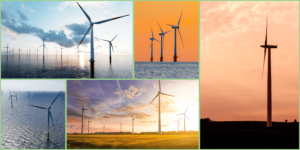The link might not immediately be obvious – but ships need fuel – and that fuel must change from oil if shipping is to decarbonize. Ships currently use 300 million tons of fossil fuel a year.

The decarbonization of shipping requires a massive shift to additional energy-saving measures and renewable energy sources such as direct wind propulsion or better hull fouling.
Fundamental, too, is the modernization of ship design and the scaling up of the use of alternative low and zero-carbon fuels.
And this is where solar and wind farms come into play.
There are opportunities for countries with access to abundant renewable energy sources to tap into new markets – renewable energy can be used to create new low-carbon fuels such as green hydrogen and green ammonia – which are low in emissions.
Renewable energy can provide plug-in power on shore so that cruise ships have zero emissions in ports.
And electric or hybrid ferries can charge their batteries – avoiding fossil fuels
Morocco is situated in one of the world’s most favorable regions for solar and wind electricity generation and with several important ports on busy shipping routes, it has put in place policies enabling the creation of large-scale renewable energy infrastructure.
Chile is another country with the potential to contribute to considerable energy production, and the capacity to serve Asia with alternative fuels.
Read Also: LESSON FROM PHILIPINES: Future Officers Weigh-In On Maritime Education
The moves to decarbonization in shipping give huge opportunities to developing countries. These changes are being driven by the International Maritime Organization’s initial greenhouse gas strategy and regulations that have been adopted by IMO to propel energy efficiency in shipping.
IMO regulations drive innovation.
IMO is further developing its regulatory framework to promote the global availability, affordability, and uptake of alternative marine fuels, taking into account developing countries’ specific needs.
Decarbonizing the shipping sector demands international cooperation between countries via IMO and bilaterally; with renewable energy producers; port authorities; and between public and private sectors.
With IMO support, together we can change the fuels powering ships and, in doing so, help make the world a safer, greener place.
Kindly like us on Facebook/twitter















